A Quote by Francois de La Rochefoucauld
It is necessary, in order to know things well, to know the particulars of them; and these, being infinite, make our knowledge eversuperficial and imperfect.
Related Quotes
We may know ourselves, and yet even with all the efforts we make, we do not know ourselves. We know our fellowman, and yet we do not know him, because we are not a thing, and our fellowman is not a thing. The further we reach into the depths of our being, on someone else's being, the more the goal of knowledge eludes us.
Finally you come to a point where you almost know it all. You are very wise. You are very pure... except for the fact that you may well have gotten caught in the last trap... the desire to know it all and still be you, "the knower." This is an impossibility. For all of the finite knowledge does not add up to the infinite. In order to take the final step, the knower must go. That is, you can only BE it all, but you can't know it all. The goal is non-dualistic - as long as there is a "knower" and "known" you are in dualism.
In order to the attaining of all useful knowledge this is most necessary, that we fear God; we are not qualified to profit by the instructions that are given us unless our minds be possessed with a holy reverence of God, and every thought within us be brought into obedience to Him.... As all our knowledge must take rise from the fear of God, so it must tend to it as its perfection and centre. Those know enough who know how to fear God, who are careful in every thing to please Him and fearful of offending Him in any thing; this is the Alpha and Omega of knowledge.
I do not know of any divine commands. I do know of most important human ones. I do not know the needs of a god or of another world. . . . I do know that women make shirts for seventy cents a dozen in this one. I do know that the needs of humanity and this world are infinite unending constant and immediate. They will take all our time our strength our love and our thoughts; and our work here will be only then begun.
The word "knowledge" itself, we like to break it down into two different words, "know" and "ledge." You've got to know the ledge. Know the limitation of things. Know where they go, know where they start from. We say knowledge is the basic foundation of the universe. But everything is first based on something being known. Then, when it's known, then it can be manifested.
The purpose of the present study is not as it is in other inquiries, the attainment of knowledge, we are not conducting this inquiry in order to know what virtue is, but in order to become good, else there would be no advantage in studying it. For that reason, it becomes necessary to examine the problem of our actions and to ask how they are to be performed. For as we have said, the actions determine what kind of characteristics are developed.
These are two different exercises. One of them is, "You don't know and I know, so just shut up and listen," and the other one is, you're curious and you're learning, and I have a way where you can learn this so you'll know it as well. And when you know it, and know why you know it, then you don't have to reference me ever again because you take ownership of the knowledge, and you can then share it with someone else.



































